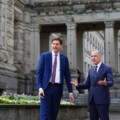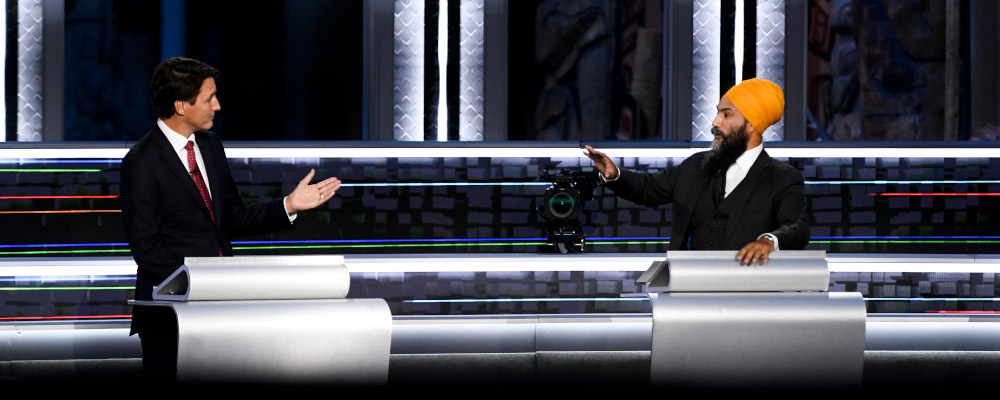A lot of the early commentary on the Liberal-NDP parliamentary agreement“The arrangement lasts until Parliament rises in June 2025, allowing four budgets to be presented by the government during this time. To ensure coordination on this arrangement, both Parties commit to a guiding principle of ‘no surprises’.” https://pm.gc.ca/en/news/news-releases/2022/03/22/delivering-canadians-now is that the NDP sold out for too little. According to this view, NDP leader Jagmeet Singh should have insisted on Cabinet posts or electoral reform or some other political concessions from the Trudeau government.
The problem with these political takes is that they misinterpret the NDP’s purpose and influence as what George Will calls an “intense, compact minority.” Its mission isn’t to win political victories—if you back out the aberrant 2011 election, it has barely secured an average of 16 percent in the nine federal elections this century—but rather to shift the country’s governance in a progressive direction.
It’s hard to argue that the NDP hasn’t been successful on this measure. Recent years have been marked by the enactment of large, permanent entitlement spending—including the making of a national childcare system—as well as new and rising taxes on corporations and high-income earners. There has also been a shift in the political culture in the direction of progressive views on climate change, criminal justice, Crown-Indigenous relations, issues of sexuality and identity, and so much more.
As I’ve previously written for The Hub, there’s little doubt that the country’s intellectual energy and ferment are now firmly on the Left. Although it may not be reflected at the ballot box, the NDP deserves tremendous credit for these policy developments.
It has contributed as much as any individual or group to the intellectual and political conditions in which the Liberal Party has flipped from a centre-right posture in the Chrétien years to an increasingly left-wing poise under Justin Trudeau.
This is the most under-reported yet fundamental development in Canadian politics and public policy. The country’s political center has shifted decidedly to the Left. One way to see this ideological change is to compare the 2000 Economic and Fiscal Update to the present government’s economic and fiscal agenda.
Then-Finance Minister Paul Martin’s speech accompanying the 2000 Economic and Fiscal Update boasted about holding the “rate of growth in program spending to less than the rate of growth in the economy” and “the largest tax cut in the country’s history” including significant reduction to corporate tax rates, the capital gains inclusion rate, and employee stock options.“Speech by the Honourable Paul Martin, P.C., M.P. Minister of Finance” https://www.canada.ca/content/dam/fin/migration/ec2000/pdf/ec00e.pdf
The 2021 Liberal Party platform, by contrast, boasted of large-scale deficit spending, raising taxes on corporations and high-income earners (including reducing preferences on employee stock options), and a far more activist view of the role of government in the economy and society.
There’s reason to believe that this week’s Liberal-NDP agreement will tilt further in this direction.
Assuming the government follows through on its promises, we’ll see, for instance, new federal action on pharmacare, dental care, and long-term care which basically amounts to extending the Medicare principle to the parts of the Canadian health-care system that presently operate according to a hybrid public-private model.
These would be massive, new health-care entitlements that will be challenging for Conservatives to reverse depending on how far along they are by 2025. That they come into effect at the precise moment that aging demographics are driving up health-care consumption means that this expansion of federal spending will necessitate some combination of higher taxes and larger deficits.
We’ll also see an acceleration of the government’s efforts to phase out conventional fossil fuels in favour of renewable energy. This tilts against recent pronouncements in Europe and elsewhere about the need for secure, stable, and democratic sources of energy.“The EU gets roughly 40% of its gas from Russia: According to figures from research group Transport & Environment, this dependence costs around $118m a day. But moving with a speed few thought possible, the EU has now laid out a strategy that could cut reliance on this fuel source by two thirds within a year.” https://www.bbc.com/news/science-environment-60664799 Yet progressive momentum in favour of decarbonization and so-called “green jobs” is too fundamental to concern itself with these prosaic considerations. The Liberals and the NDP are in lockstep on “just transition” even if Russia’s invasion of Ukraine has shown that the “just” policy, at least in the short- and medium-term, may be to sell our oil and gas resources to the world.“Move forward with Just Transition legislation, guided by the feedback we receive from workers, unions, Indigenous peoples, communities, and provinces and territories.” https://liberal.ca/our-platform/ensuring-workers-and-communities-prosper-as-we-move-to-net-zero/
The main point here is that even without seats in the Cabinet, the NDP is still able to exercise enormous influence over government policy by shaping the broader intellectual and political context in which the Trudeau government inhabits. That’s the essence of Will’s key insight about the importance of intense, compact minorities.
Who needs mid-level Cabinet posts when you can be the intellectual architect of the government’s policy agenda? Justin Trudeau may be the prime minister. But Jagmeet Singh is in his head telling him and his ministers what to think. This week’s parliamentary agreement only codifies it.
Recommended for You

‘The EV subsidies were a Faustian bargain’: Canada’s auto sector is in big trouble

‘This guy is standing in the way’: Jason Kenney on why David Eby is a bigger threat to Canada’s unity than Alberta separatists

‘There isn’t a one-size-fits-all approach’: The risks of over-regulating short-term rentals in Canada

Trevor Tombe: No, Canada didn’t give the U.S. a trillion-dollar gift—but there’s still reason to worry




